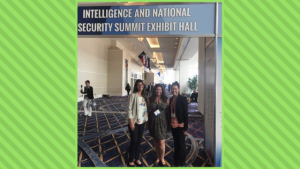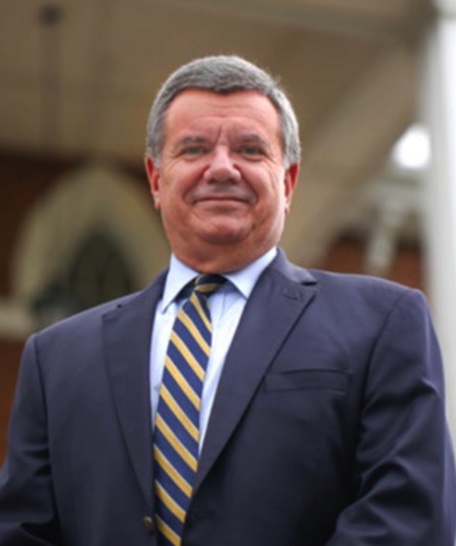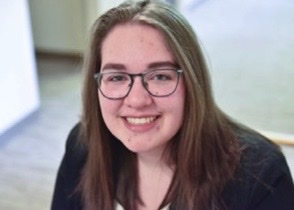Reflections from INSA Summit 2018

Written By: Charlotte Walton (BS Political Science 18’)
On September 3rd-4th, I was afforded the privilege of attending the Intelligence & National Security Summit at National Harbor, Maryland. The Military Leadership Center and the Office of Leadership and Global Engagement made this possible, and I am honored to have been chosen along with fellow Political Science major, Laura Morales Cardenas. We were chosen by the Military Leadership Center due to our previously demonstrated dedication to learning about foreign affairs, cyber activity, and military subjects.
There were many keynote speakers at this event. So many, in fact, that to name them all might seem superfluous. To name a few, Dan Coats, the Director of National Intelligence, and John Rood, the Undersecretary of Defense DOD spoke on Intelligence and Security related topics, in addition to various Directors from the CIA, National Intelligence, NSA, and DIA. Perhaps the most interesting to hear speak was John Rood. He spoke of military theory and politics in relation to the current threats that face the United States, being “China and Russia particularly.” Rood spoke of potentially working with friends and allies to in the East and developing technology for better use no the battlefield. Rood expanded that though foreign actors exist as threats to the U.S., the “biggest threat to the U.S. is the great power struggle,” alluding to Clausewitzian theory that war is an extension of politics. The summit promoted forward thinking amongst the many distinguished speakers and among those in attendance, who themselves ranged across the nation from intelligence and security backgrounds, to college students like myself.
Topics covered ranged from artificial intelligence to national security challenges. Expert speakers conducted a question and answer panel, revealing the projected direction of technology and security issues across the world.
Overall, there were two themes covered in the conference, being; 1. There are global actors and countries developing at alarming speeds, and 2. Through the integration of information and our developing knowledge, the United States can remain a superpower. The
developing countries referenced were China and Russia notably, however North Korea and Iran were also brought into the conversation. Rood spoke on the developing nuclear technologies in these countries, emphasizing that destabilizing actions taken by these countries does not align with U.S. interests, again referring to the “great power struggle” looming on the horizon. Other speakers agreed with this point and additionally addressed the second. A few who agreed with Rood’s analysis were Kari Bingen, the Deputy under Secretary of Defense for Intelligence, and LTG (ret.) Jeff Kimmons who worked for 36 years in CENTCOM. Kimmons agreed that Russia, China, and North Korea challenge the United States in Rood’s reference to “the great power struggle,” and Bingen called it a “power competition” between the foreign actors. Bingen outlined a the goals of the Secretary of Defense for Intelligence, focusing on deepening alliances and partnerships, and increasing integration among the security forces to achieve superiority. This integration was in reference to the security agencies working stateside, in addition to our foreign allies. The information sessions that I attended echoed thoughts from the United States’ National Defense Plan, and the conversation was driven by eager problem solvers from a variety of fields, spanning from technological fields to government. The variety of speakers and attendees spoke to the spirit of the Summit.
I was very glad to have taken Intro to Comparative Politics, Intro to Strategic and Security Studies, as well as International Law prior to attending this Summit. The Summit included political, strategic, and international topics in comparison to the development of the United States. Political Science course background allowed me to understand further than just the surface level issues that exist in the United States and abroad. I was able to understand the complexities that John Rood, Kari Bingen, and Jeff Kimmons spoke of, in addition to the variety of other panelists.
I was honored to have been selected to attend this event. To future students, I would highly recommend to be involved with intelligence and security conversations, and to attend events like this whenever the opportunity arises. To learn more about the INSA Summit 2018, you can go to
https://events.jspargo.com/INSS18/Public/enter.aspx. To learn more about INSA and future events, you can go to https://www.insaonline.org/?ID=69120.


